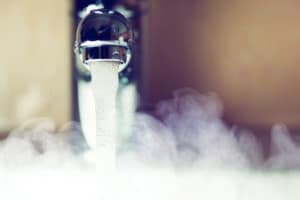
Most people give very little thought to their hot water heater – until there is no hot water! Then you are confronted with an emergency situation which is stressful and expensive. Older units may suffer from decreased efficiency due to age, sediment accumulation, and rust. Just like any other equipment in your home, regular maintenance on your water heater will increase efficiency and extend the life of your unit.
Identify Any Signs of Trouble
There are several signs that could indicate a problem with your water heater. The most obvious sign is a lack of hot water. Another might be a pool or trail of water coming from your unit, indicating there is some sort of internal damage and your unit may need to be replaced. You might also notice rust in your water or hear a rumbling or knocking sound when you turn on the hot water. This can be caused by sediment in your tank and may be resolved by draining the sediment.
Water Heater Efficiency
You obviously want all of your household equipment to be as efficient as possible, including your water heater. One way to ensure this is regular maintenance. A yearly cleaning to remove any sediment and check for rust can go a long way towards maintaining efficiency. Haldeman will also inspect the exterior of your unit to ensure all parts are working correctly. Also, prevent overheating and save on energy bills by keeping water temperatures between 115 and 120 degrees. This reduces the pressure on your unit. Efficiency may also be lost due to a buildup of calcium carbonate which settles at the bottom of your tank and reduces the efficiency of the heating element.
Replacement versus Repair
On average, water heaters need to be replaced about every 10 years. Newer units can operate as much as 20% more efficiently than units that are 10 years old or more. Prices on water heaters have recently increased due to steel tariffs and will most likely continue to rise. If you are considering a new water heater, now is a great time to buy. Contact us today to discuss your options.
